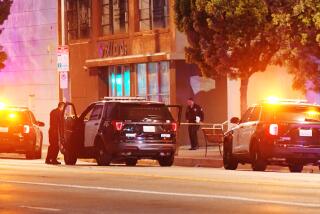Officer Comes Up a Winner in Ominous Stairwell Standoff
Restraint and risk.
The numbers tell only part of the story.
Through the first nine months of last year, there were 27 “officer-involved” shootings by the San Diego police, nine of them fatal.
During the same period this year, the figures are 10 shootings, three fatalities. A sharp decrease by any standard.
Maybe it’s just the cyclical nature of events.
Or maybe new training procedures that stress using alternatives to deadly force (stun guns, dogs, nets, etc.) are having an impact.
Or maybe it’s just cops willing to use more restraint in dangerous, heart-pumping confrontations.
A case in point: San Diego cop Andrew Spear, 29, three years on the force, got a radio call at 6:50 a.m. recently about a man brandishing a gun on the streets of East San Diego.
The gunman had been partying (i.e. drinking) all night.
There had been an argument involving a woman, somebody had called police. It’s a common story.
Spear spotted the gunman, drew his service revolver and gave chase on foot. The gunman refused to stop or drop his gun and instead ran into an apartment building.
He stopped at the top of the stairs, looked down at Spear about 15 feet away and said ominously:
“This is a 9-millimeter Glock 17. I got 17 shots, you only have 15.”
(A Glock 17 is an Australian semi-automatic, favored by military and police, known for its accuracy and stopping power.)
For several tense moments, the gunman held his gun at chest-level, barrel pointed upwards. A flick of his wrist and it would have pointed at Spear’s chest.
“Drop it!” Spear ordered, repeatedly. He had his own gun aimed directly at the gunman.
Glassy eyed and slurring, the 26-year-old gunman again decided to wisecrack: “Here, catch it.”
Finally, he dropped his gun and, still balky and difficult, he was arrested on a misdemeanor charge of carrying a loaded gun in public.
“I kept giving him the benefit of the doubt that he was going to drop it,” Spear said. “Thank God he finally did.”
Norman Stamper, the assistant police chief, said Spear would have been “morally and legally justified” in using deadly force and that the Police Department would have backed him to the hilt. He called Spear’s actions “very courageous.”
Spear said the danger of the situation hit him only afterward.
“It wasn’t like arresting someone for drugs or a stolen car, which is a kick in the pants,” he said. “This wasn’t fun. It was my first call, and I was on edge the rest of the day.”
Still, he said he will not hesitate to chase another armed suspect, even knowing the risk:
“It’s in my job description. If I stop doing that, I might as well stop being a police officer.”
By the way, do you know how much the city of San Diego (which pays as well as most cities) pays cops like Spear to chase and arrest guys in marginal parts of town who’ve been drinking all night and waving loaded guns?
About $750 a week.
How many of you would do that kind work for that kind of money? Don’t all raise your hands at once.
Prying Eye
J. Edgar: at work and play.
The just-released biography “J. Edgar Hoover: The Man and His Secrets,” by Curt Gentry, is chockablock with San Diego references.
Not surprising, since Hoover took a “nonvacation” in Del Mar every summer for nearly three decades during racing season.
According to Gentry, he also used the FBI office in San Diego to gather secrets about the sex lives and drug/alcohol habits of Hollywood stars.
At Del Mar, he loved to pal with Texas oilman Clint Murchison, who then owned both the Del Mar racetrack and a small resort hotel in La Jolla.
Not that all went well for Hoover in San Diego.
Gentry reports that Hoover, who often sought out celebrities, spotted novelist Raymond Chandler drinking at a La Jolla restaurant one night.
Through a waiter, Hoover asked Chandler to come join him and his FBI associate, Clyde Tolson, for dinner. The crusty Chandler “told the waiter to tell Hoover he could go to hell.”
Hoover then unleashed his agents on Chandler’s private life: “Chandler’s FBI file runs to over 250 pages.”
More to Read
Sign up for Essential California
The most important California stories and recommendations in your inbox every morning.
You may occasionally receive promotional content from the Los Angeles Times.










